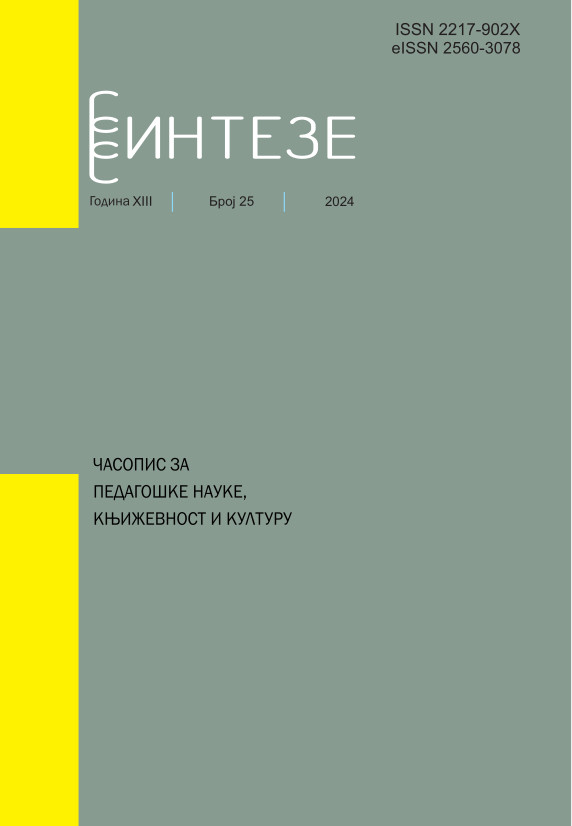Učenje kroz igru u nastavi matematike
Sažetak
Od svih ljudskih aktivnosti najviše zadovoljstva čoveku pričinjava igra, bilo da se radi o sportskim, kompjuterskim, društvenim, edukativnim ili nekim drugim igrama. Kako je igra jedna od važnijih dečijih potreba, ona je ujedno i najlakši način da se učenicima približe nastavni sadržaji. Zato je učenje kroz igru jedna od veoma snažnih motivacionih nastavnih metoda, koja kod učenika podstiče kreativnost izraženu kroz imaginaciju, logičko mišljenje, emocionalno ispoljavanje i motivaciju za rad i učenje. Učenje kroz igru utiče i na svestrani razvoj ličnosti učenika, jer utiče na kognitivni, emocionalni, socijalni i fizički razvoj deteta, pripremajući ga za budući život u svetu odraslih.
Reference
Aldridge, S., & Badham, V. (1993). Beyond Just a Game. In Pamphlet Number 21. Primary Mathematics Association.
Antonyan, H. (2012, January 27). My Edu Way. https://myeduway.wordpress.com/2012/02/27/%d5%af%d5%b8%d5%b8%d6%80%d5%a4%d5%ab%d5%b6%d5%a1%d5%bf%d5%a1%d5%b5%d5%ab%d5%b6-%d5%b0%d5%a1%d6%80%d5%a9%d5%b8%d6%82%d5%a9%d5%b5%d5%b8%d6%82%d5%b6/janes1/
Bragg, L. (2006). Students` impressions of the value of games for the learning of mathematics. In J. Novotná, H. Moraová, M. Krátká, & N. Stehlíková (Eds.), Proceedings 30th Conference of the International Group for the Psychology of Mathematics Education (Vol. 2, pp. 217–224). International Group for the Psychology of Mathematics Education. https://dro.deakin.edu.au/articles/conference_contribution/Students_impressions_of_the_value_of_games_for_the_learning_of_mathematics/20549604/1
Davies, B. (1995). The Role of Games in Mathematics. Square One, 5(2), 34–45.
Janković, B. B. (2018). Projektna metoda u aktivnostima usvajanja matematičkih pojmova. Sinteze - Časopis Za Pedagoške Nauke , Književnost i Kulturu, 14, 79–90. https://doi.org/10.5937/sinteze7-17439
Offenholley, K. (2012). Gaming Your Mathematics Course: The Theory and Practice of Games for Learning. Journal of Humanistic Mathematics, 2(2), 79–92. https://doi.org/10.5642/jhummath.201202.07
Oldfield, B. J. (1991). Games in the Learning of Mathematics: 1: A Classification. Mathematics in School, 20(1), 41–43.
Özdoğan, E. (2011). Play, mathematic and mathematical play in early childhood education. Procedia - Social and Behavioral Sciences, 15, 3118–3120. https://doi.org/10.1016/j.sbspro.2011.04.256
Russo, J., Bragg, L., & Russo, T. (2021). How Primary Teachers Use Games to Support Their Teaching of Mathematics. International Electronic Journal of Elementary Education, 13(4), 407–419. https://doi.org/10.26822/iejee.2021.200
Russo, J., Russo, T., & Bragg, L. A. (2018). Five principles of educationally rich mathematical games. Australian Primary Mathematics Classroom, 23(3), 30–34.
Vankúš, P. (2005). Efficacy of teaching mathematics with method of didactical games in a–didactic situation. Quaderni Di Ricerca in Didattica, 15, 90–105.
Wager, A. A. (2013). Practices that Support Mathematics Learning in a Play-Based Classroom. In L. D. English & J. T. Mulligan (Eds.), Reconceptualizing Early Mathematics Learning (pp. 163–181). Springer Netherlands. https://doi.org/10.1007/978-94-007-6440-8_9
Sva prava zadržana (c) 2024 Dalibor D. Teokarević

Ovaj rad je pod Creative Commons Autorstvo 4.0 međunarodnom licencom.
Autori koji objavljuju u ovom časopisu pristaju na sledeće uslove:
- Autori zadržavaju autorska prava i pružaju časopisu pravo prvog objavljivanja rada i licenciraju ga "Creative Commons Attribution licencom" koja omogućava drugima da dele rad, uz uslov navođenja autorstva i izvornog objavljivanja u ovom časopisu.
- Autori mogu izraditi zasebne, ugovorne aranžmane za neekskluzivnu distribuciju članka objavljenog u časopisu (npr. postavljanje u institucionalni repozitorijum ili objavljivanje u knjizi), uz navođenje da je članak izvorno objavljen u ovom časopisu.
- Autorima je dozvoljeno i podstiču se da postave objavljeni članak onlajn (npr. u institucionalni repozitorijum ili na svoju internet stranicu) pre ili tokom postupka prijave rukopisa, s obzirom da takav postupak može voditi produktivnoj razmeni ideja i ranijoj i većoj citiranosti objavljenog članka (Vidi Efekti otvorenog pristupa).

